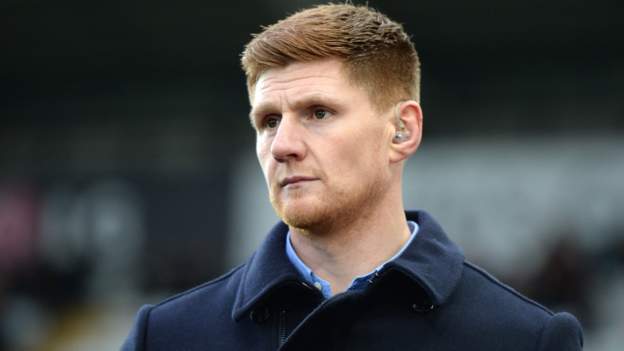Andrew Coombs: Former Wales forward reveals dementia diagnosis
Written by I Dig Sports
Former Wales forward Andrew Coombs has revealed he has been diagnosed with dementia and probable chronic traumatic encephalopathy (CTE).
The 39-year-old has been named as one of 295 former players suing rugby's authorities over brain injuries.
Coombs, a Six Nations winner in 2013, issued a statement on social media.
"I'm writing to share some personal news that has deeply impacted my life and the lives of my loved ones," he said.
"Eight months ago, I was diagnosed with dementia and probable chronic traumatic encephalopathy after suffering symptoms for around four years.
"This first came to my attention whilst featuring on a live episode of [BBC Wales television programme] Scrum V Sunday, where discussions around CTE symptoms resonated with me deeply.
"It was a challenging decision to seek medical advice. However, understanding the changes happening within me became imperative.
"The diagnosis was a heartbreaking one but it answered many questions that had been lingering in my mind and worrying me for so long.
"The changes put significant strain on my marriage and happiness.
"Sharing this news with my children was one of the hardest things I've ever done."
The High Court heard last Friday that an application for the 295 players' cases to be heard collectively would be made next year, possibly in April or May.
It would allow all the lawsuits against World Rugby, the Rugby Football Union [RFU] and the Welsh Rugby Union [WRU] to be managed together.
More than 70 Welsh players are part of the case, including more than 30 former internationals.
Ex-Dragons captain Coombs retired from rugby aged 31 as a result of a serious knee injury.
"The reality of my health situation is difficult to accept, and I didn't want this diagnosis to become my identity, as my knee injury did back in 2014," Coombs' statement continued.
"There are trial drugs available for my condition, and I am hopeful [that I can] join the trials as soon as a spot opens up.
"Knowing my diagnosis has also allowed me to prepare for what's coming and to put my family's future at the forefront of my mind.
"It has also helped my family understand the strange character and behaviour changes."
Former Wales internationals Ryan Jones, Colin Charvis and Gavin Henson are among the well-known players involved in the case.
The claimants allege rugby's governing bodies failed to put in place reasonable measures to protect their health and safety.
Susan Rodway, representing them, said in court filings the defendants "ought to have known of the likelihood of long-term neurological complications due to cumulative concussive or sub-concussive blows to the head".
This alleged failure is said to have caused disorders such as motor neurone disease, early onset dementia, epilepsy and Parkinson's disease.
World Rugby, the RFU and WRU said last week they could not comment on the case or contact players as they had not received full details.
But in a joint statement issued on Friday, the governing bodies said: "Whilst today's case management hearing was necessarily about legal process, we must not forget about the people and players at the heart of this case.
"We want them to know that we care deeply about their struggles, that we are listening and that they are members of the rugby family."
'Work to be done'
Coombs, who played as a lock or in the back row, added: "Rugby has always held a significant place in my life, and it's pleasing to see the strides being made towards safeguarding player health.
"However, there's still much work to be done.
"My role as a pundit for the BBC and S4C fuels my passion to enlighten those who underestimate the seriousness of these health issues, emphasising that rugby has evolved from what it was years ago.
"My mission is to impart knowledge to those resistant to the necessary changes, and I'm committed to continuing this education through my features on these remarkable programmes.
"I do question those who were responsible for managing the health risks associated with repetitive head collisions and concussions.
"Some may not understand my decision to join the legal action and that's okay. Unfortunately I am currently unable to share my personal experiences that led to this decision, which might have provided more clarity.
"Whilst I am devastated by my diagnosis, my spirit remains strong and, in a strange way, the diagnosis has brought relief and clarity, as it has provided answers to many of my questions.
"I'm trying to be myself as much as possible, enjoying life to the fullest, not allowing my condition to destroy my mental health.
"To those close friends and colleagues who have reached out, your support and care mean more than words can express.
"Thank you for taking the time to read this. your understanding and support mean the world to me and my family."















 Phone: (800) 737. 6040
Phone: (800) 737. 6040 Fax: (800) 825 5558
Fax: (800) 825 5558 Website:
Website:  Email:
Email: 






